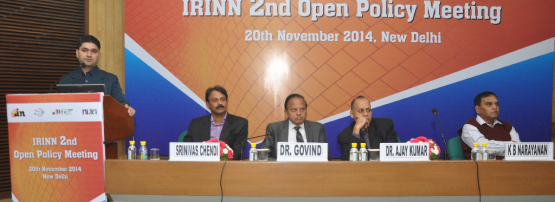
Indian Registry for Internet Names and Numbers (IRINN), the National Internet Registry for India, held its second Open Policy meeting on 20 November 2014 at India Habitat Center in Delhi.
I attended this interesting meeting, and wanted to share with you some of the highlights.
IRINN membership now stands at 740. Of this, 561 are new members and 179 transferred from APNIC to IRINN. More than 80 participants, including some APNIC direct members, came from across India to attend the second OPM.
We heard from Dr Ajay Kumar, Chairman of NIXI and Joint Secretary of DEITY (who recently wrote an interesting blog post for APNIC). He spoke about India’s role in the global Internet community, saying “It is important that India is represented in all global organizations. I am very happy NIXI provides fellowships to allow Indians to participate in IETF, APNIC, APRICOT, ICANN, IGF, and other organizations.”
Dr Govind, CEO of NIXI, presented IRINN’s future plans, including the Whois database and integration with their registration system, MyIRINN improvements, and implementation of new mailing lists.
IRINN implemented the IPv4 transfer policy in line with APNIC policy and has received four transfers to date. IRINN will also implement “Geoloc” and will proactively insert geolocation of an IP block in the Whois object before communicating the allocation details to their members.
Along with IRINN staff, Ruby Rani, Abhisekh Misra, and Chandra Prakash, I presented an Internet Resource Management tutorial, highlighting and explaining the essentials of Internet resource management. Topics covered in the tutorial included understanding the structures, processes, procedures, and policies involved in requesting, allocating, and managing IPv4 and IPv6 Internet addresses and Autonomous System (AS) numbers including the importance of Reverse DNS delegations.
India is very close to becoming the second largest Internet marketplace in the world after China. The Government of India has recently launched the Digital India program to ensure the country becomes a digitally-infused nation over the next three years. This may have a big impact on IRINN and it is likely the demand for training in India will increase. APNIC and NIXI are working on partnering on capacity building programs to meet this demand.
The views expressed by the authors of this blog are their own and do not necessarily reflect the views of APNIC. Please note a Code of Conduct applies to this blog.
